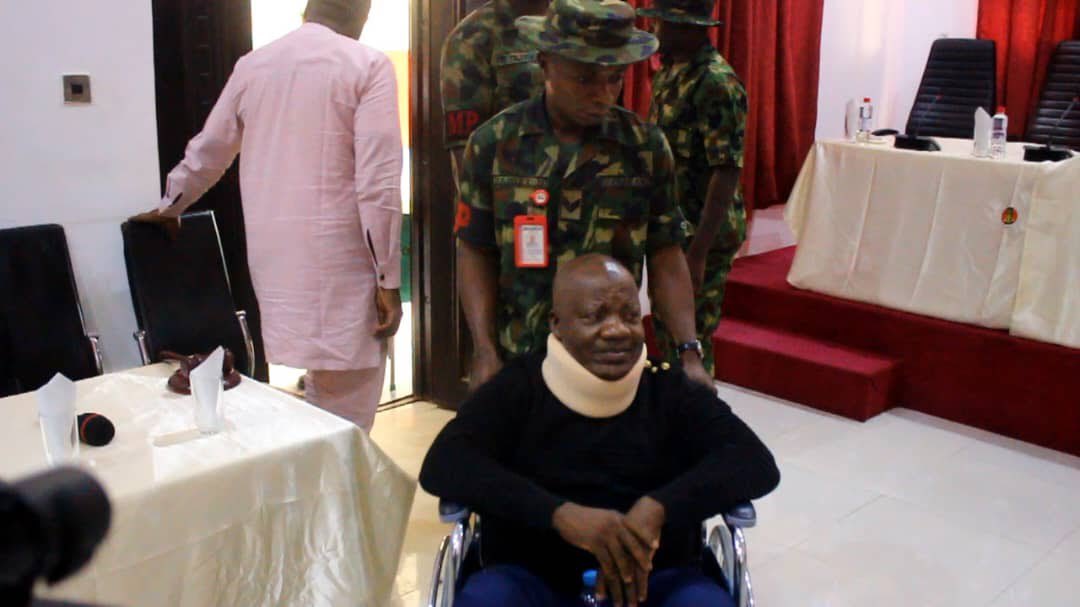On Monday, August 25, 2025, Katsina State Acting Governor, Malam Faruk Lawal-Jobe, delivered an impassioned plea for enhanced military intervention to address the escalating menace of banditry and kidnapping in the state. The call was made during a high-profile courtesy visit by the Chief of Army Staff (COAS), Lieutenant-General Olufemi Oluyede, at the Katsina Government House. This meeting underscored the state’s dire security situation and the urgent need for coordinated efforts to restore peace and stability. The Acting Governor’s appeal for additional ground troops and intensified air operations reflects the growing concern over the persistent threat posed by armed bandits in Katsina, a state long plagued by violent crimes. This report provides an in-depth analysis of the meeting, its implications, and the broader context of insecurity in Katsina State, while exploring the collaborative efforts between the state government and the Nigerian military to tackle this multifaceted challenge.
A State Under Siege: The Context of Banditry in Katsina
Katsina State, located in Nigeria’s North-West geopolitical zone, has been a hotspot for banditry, kidnapping, and other forms of violent crime for over a decade. The state’s proximity to the volatile Sahel region, coupled with its vast ungoverned spaces, porous borders, and socio-economic challenges, has made it a fertile ground for criminal activities. Bandits, often operating in large, well-armed groups, have terrorized rural communities, targeting farmers, traders, and religious gatherings. These attacks have led to hundreds of deaths, thousands of displacements, and significant economic disruption, particularly in the agricultural sector, which is the backbone of Katsina’s economy.
The recent attack in Malumfashi, where worshippers were targeted, is a stark reminder of the audacity and brutality of these criminal elements. Such incidents have heightened public fear and eroded confidence in the state’s security apparatus. The Acting Governor’s call for increased military presence comes against the backdrop of these recurring attacks, which have stretched local security forces thin and exposed the limitations of current strategies. Katsina’s challenges are not unique but are part of a broader wave of insecurity affecting Nigeria’s North-West, where states like Zamfara, Sokoto, and Kaduna are also grappling with similar threats.
The Meeting: A Call for Action
The courtesy visit by Lieutenant-General Olufemi Oluyede provided a critical platform for dialogue between Katsina’s political leadership and the Nigerian military. Acting Governor Lawal-Jobe seized the opportunity to articulate the state’s pressing needs in the fight against banditry. He emphasized that the deployment of additional ground troops was not merely a request but a necessity to reclaim areas under the control of bandits. “The situation in Katsina demands a more robust military presence, particularly in the frontline local government areas where banditry is most prevalent,” Lawal-Jobe stated. He highlighted the need for intensified air operations to target bandit hideouts in remote forests, which have served as safe havens for criminals.
Lawal-Jobe’s appeal was grounded in a strategic vision for collaboration between the state government and the military. He assured the COAS of the state’s commitment to providing credible intelligence, which is often a critical missing link in military operations. Intelligence gathering has been a persistent challenge in the fight against banditry, as criminals often blend into local communities or operate in hard-to-reach terrains. The Acting Governor’s promise to mobilize local resources and residents to support security efforts reflects a growing recognition that community involvement is essential for sustainable success.
The state’s investment in local initiatives was a key point of discussion. Katsina has taken proactive steps to empower its residents through community-based security programs. These initiatives include the recruitment and training of local vigilantes, who work alongside security forces to provide on-the-ground intelligence and support. Lawal-Jobe noted that these efforts have yielded some results but require the backing of a stronger military presence to achieve their full potential. “We have mobilized our people, and they are ready to work with the military. What we need now is the firepower and resources to match the determination of our communities,” he said.
The Military’s Response: A Pledge for Greater Support
Lieutenant-General Oluyede, who was on an assessment tour of Katsina following the Malumfashi attack, responded with a firm commitment to bolster military operations in the state. He assured the Acting Governor that the Nigerian Army would deploy additional personnel and assets to enhance ongoing efforts. “We are not unaware of the challenges in Katsina, and I want to assure you that the Nigerian Army is fully committed to restoring peace in this state,” Oluyede said. His pledge included the deployment of more troops to hotspot areas and the provision of advanced equipment to support ground and air operations.
The COAS’s visit was not merely symbolic; it was part of a broader effort to evaluate the effectiveness of military strategies in the North-West. The recent attack on worshippers in Malumfashi, which claimed several lives, prompted Oluyede’s tour to assess the situation on the ground and engage with local stakeholders. During the meeting, he expressed condolences to the families of the victims and commended the Katsina State Government for its unwavering support for the military. “The cooperation we have received from the state government has been exemplary, and we are determined to reciprocate by intensifying our efforts,” he said.
Oluyede also emphasized the importance of intelligence gathering and community cooperation in the fight against banditry. He described insecurity as a “collective challenge” that requires the active participation of all stakeholders, including government agencies, traditional leaders, and ordinary citizens. “Security is everybody’s business. Together, we can make Nigeria safer,” he declared, echoing a sentiment that has become a rallying cry in Nigeria’s battle against violent crime. The COAS’s remarks underscored the need for a multi-pronged approach that combines military might with community engagement and intelligence-driven operations.
The Broader Implications: Challenges and Opportunities
The meeting between Lawal-Jobe and Oluyede highlights both the challenges and opportunities in addressing Katsina’s security crisis. On one hand, the state’s reliance on military intervention reflects the severity of the banditry problem and the limitations of local security forces. The Nigerian Police Force, which is primarily responsible for internal security, has been overwhelmed by the scale and sophistication of bandit attacks. The military’s involvement, while necessary, also raises questions about the long-term sustainability of such operations, given the strain on Nigeria’s armed forces, which are already engaged in multiple theaters of conflict, including the Boko Haram insurgency in the North-East and separatist agitations in the South-East.
On the other hand, the collaboration between the state government and the military presents an opportunity to develop a more integrated approach to security. Katsina’s investment in local initiatives, such as vigilante groups and community mobilization, is a step in the right direction. These efforts can complement military operations by providing grassroots intelligence and fostering a sense of ownership among residents. However, the success of such initiatives depends on adequate funding, training, and coordination with formal security agencies.
The Acting Governor’s call for intensified air operations also points to the strategic importance of leveraging technology in the fight against banditry. Aerial surveillance and targeted airstrikes have proven effective in disrupting bandit activities in other parts of the North-West, such as Zamfara and Sokoto. However, the use of air operations must be carefully calibrated to avoid civilian casualties, which could undermine public support for military efforts. The Nigerian Air Force, which has been actively involved in operations in the North-West, will need to work closely with ground forces to ensure precision and effectiveness.
The Role of Intelligence in Combating Banditry
One of the recurring themes in the meeting was the critical role of intelligence in addressing Katsina’s security challenges. Bandits often exploit the element of surprise, launching attacks on unsuspecting communities and retreating to remote hideouts. Effective intelligence gathering can help security forces anticipate and prevent such attacks. Lawal-Jobe’s assurance of credible intelligence from the state government is a positive development, but it also raises questions about the mechanisms for sharing and acting on such information.
Community cooperation is a vital component of intelligence gathering. In many cases, residents of affected areas have valuable information about the movements and activities of bandits but are reluctant to share it due to fear of reprisals. Building trust between communities and security forces is therefore essential. The state’s efforts to mobilize residents through local initiatives could help bridge this gap, but it will require sustained engagement and protection for informants.
The COAS’s emphasis on community cooperation also highlights the need for a broader societal approach to security. Traditional and religious leaders, who wield significant influence in Katsina’s predominantly rural communities, can play a key role in mobilizing support and encouraging residents to provide information. Civil society organizations and the media also have a role to play in raising awareness and fostering dialogue between communities and security agencies.
Katsina’s Local Initiatives: A Model for Others?
Katsina’s investment in local security initiatives is worth examining in greater detail. The state has taken steps to recruit and train vigilante groups, which operate under the supervision of security agencies. These groups, often composed of local youths, are familiar with the terrain and can provide valuable intelligence to support military operations. In some cases, vigilantes have been instrumental in repelling attacks and protecting communities from bandits.
However, the use of vigilante groups is not without challenges. There have been concerns about the lack of proper training and oversight, which can lead to human rights abuses or exacerbate communal tensions. The state government will need to ensure that these groups are properly regulated and integrated into the broader security framework. Additionally, the reliance on vigilantes should not be seen as a substitute for professional security forces but rather as a complementary measure.
Katsina’s approach could serve as a model for other states in the North-West, many of which face similar challenges. By combining local initiatives with military support, Katsina is attempting to create a hybrid security model that leverages the strengths of both formal and informal actors. If successful, this model could be scaled up to other regions, provided there is adequate funding and political will.
The Human Cost of Insecurity
The recent attack in Malumfashi, which was a focal point of the COAS’s visit, underscores the devastating human cost of banditry in Katsina. The targeting of worshippers during a religious gathering is a grim reminder of the indiscriminate nature of these attacks. Families have been torn apart, communities displaced, and livelihoods destroyed. The psychological toll on residents, particularly in rural areas, cannot be overstated. Many live in constant fear, unable to farm their lands or send their children to school.
The COAS’s condolences to the victims’ families reflect the military’s recognition of the human dimension of the crisis. However, condolences alone are not enough. The government and the military must prioritize the protection of vulnerable communities and ensure that justice is served for victims of banditry. This includes not only neutralizing the perpetrators but also providing support for survivors, including psychosocial care and economic assistance.
The Way Forward: A Multi-Faceted Approach
The meeting between Acting Governor Lawal-Jobe and Lieutenant-General Oluyede marks a critical step in addressing Katsina’s security challenges, but it is only the beginning. To achieve lasting peace, the state and the federal government must adopt a multi-faceted approach that combines military action with socio-economic interventions. Banditry is not solely a security problem; it is also a symptom of deeper issues such as poverty, unemployment, and lack of access to education. Addressing these root causes will require long-term investments in development programs, job creation, and infrastructure.
At the same time, the military must sustain its commitment to Katsina by ensuring that the promised troops and resources are deployed promptly. Coordination between the army, air force, police, and other security agencies is critical to avoid duplication of efforts and maximize impact. The use of technology, such as drones and satellite imagery, can enhance the military’s ability to track and neutralize bandit groups.
Community engagement must remain at the heart of these efforts. The state government’s initiatives to mobilize residents and foster cooperation with security forces are commendable, but they must be scaled up and sustained. Building trust between communities and security agencies will require transparency, accountability, and a commitment to protecting civilians.
Conclusion
The courtesy visit by Lieutenant-General Olufemi Oluyede to Katsina State Acting Governor Malam Faruk Lawal-Jobe was a pivotal moment in the state’s ongoing battle against banditry. The Acting Governor’s call for additional ground troops and intensified air operations reflects the urgency of the situation, while the COAS’s pledge of greater military support offers hope for improved security. The collaboration between the state government and the military, underpinned by local initiatives and community cooperation, provides a blueprint for addressing Katsina’s challenges.
However, the road ahead is fraught with difficulties. The persistent threat of banditry, coupled with the socio-economic factors that fuel it, requires a comprehensive and sustained response. Katsina’s experience could serve as a case study for other states in Nigeria’s North-West, where insecurity continues to undermine development and stability. By combining military might with community engagement and development programs, Katsina has the potential to turn the tide against banditry and restore peace to its people. The success of these efforts will depend on the commitment of all stakeholders—government, military, and citizens alike—to work together in pursuit of a safer and more secure future.






